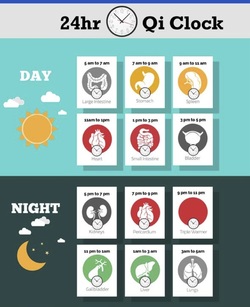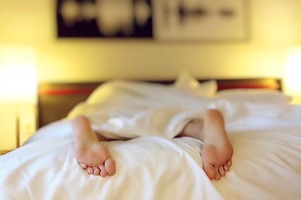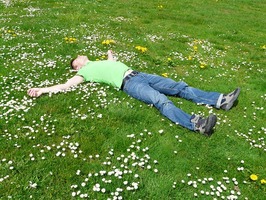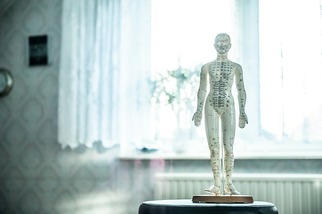 Photo Credits: ©iStock.com/kirin_photo, ©iStock.com/Naddiya Photo Credits: ©iStock.com/kirin_photo, ©iStock.com/Naddiya Most people are familiar with the terms diurnal and nocturnal. Diurnal means active during the daytime, while nocturnal means active during the nighttime. Together the two make up a 24-hour cycle known as a day. But, in Traditional Chinese Medicine, this 24-hour cycle is viewed as much more than just a day in the life. The 24 hours of the day are viewed as increments of time and every two-hour section is associated with a speci c energetic meridian that runs through the body. This is known as the Qi clock. Do you wake up every night or every morning about the same time? Have you ever wondered why? Some people call that an internal clock. In Chinese medicine, this gives a much deeper look into how the body functions. Chinese medical theory divides the body based upon the 12 energetic meridians. Each of the meridians is assigned a two-hour time slot. For example, the liver meridian is associated with the hours of 1 a.m. to 3 a.m. If you wake up during this time frame, then there is an issue with your liver meridian. So knowing this information can be very important to an acupuncturist/Chinese medicine practitioner. During a 24-hour period, your energy or Qi (pronounced “chee”) moves through the organ systems in two-hour intervals. Qi draws inward to help restore the body between the hours of 1 a.m. and 3 a.m. The liver cleanses the blood and performs other functions, such as getting the blood ready to travel outward into the rest of the body. Over the next 12 hours, Qi cycles through the organs that assimilate, digest and eliminate food through the body or our diurnal organs. By mid-afternoon, the body begins to slow down again in preparation for the nocturnal phase. The nocturnal phase is all about restoring and maintaining. So when one organ system is at its peak, its counterpart, on the opposite side of the clock is at its lowest point. An example is 7 a.m. to 9 a.m., which are the hours of the stomach. This is when the stomach is at its peak and also why it is recommended to eat a big breakfast. On the opposite side of the clock lies the pericardium, which is associated with the pituitary, hypothalamus and reproductive organs. The pericardium is at its weakest point between the hours of 7 a.m. and 9 a.m. Here’s a brief summary of the 24 hour Qi cycle: • 3a.m.to5a.m.islungtime • 5 a.m. to 7 a.m. is large intestine time • 7 a.m. to 9 a.m. is stomach time • 9 a.m. to 11 a.m. is spleen time • 11 a.m. to 1 a.m. is heart time • 1 p.m. to 3 p.m. is small intestine time • 3 p.m. to 5 p.m. is urinary bladder time • 5 p.m. to 7 p.m. is kidney time • 7 p.m. to 9 p.m. is pericardium time • 9 p.m. to 11 p.m. is triple burner time (associated with the thyroid and adrenals) • 11 p.m. to 1 a.m. is gall bladder time • 1 a.m. to 3 a.m. is liver time So if you have recurring problems at the same time every day, then there is a good chance that the organ/meridian associated with that time is in distress. This is why Traditional Chinese Medicine practitioners ask so many questions and also why they look at the body as a whole instead of just one particular organ. By understanding that every organ/energetic meridian has a maintenance schedule to keep daily, you can then treat your body properly so you achieve the ultimate health and well-being and acupuncture can help you achieve that goal. Acupuncturists treat the body based on things like your symptomology, your pulses, your tongue and the 24-hour Qi clock indications you exhibit. The goal is to bring the body back into balance and knowing when the meridians are at their peaks and valleys is a great place to begin.  Insomnia is a phenomenon almost everybody experiences at some point in their life. And most of us don’t know how or why it happens. Insomnia is defined as difficulty falling asleep, despite being tired. Combatting insomnia may be easier than you think. Here are five simple ways to fall asleep faster and stay asleep all night. 1. Turn off your phone In today’s society, we are almost surgically attached to our phones, iPads, laptops, etc. And while the devices keep us informed and connected, they are also harm us when it comes to our sleep. Smartphones and other gadgets emit blue wavelengths. These wavelengths suppress the production of melatonin in our bodies. Melatonin is a natural hormone that makes you feel sleepy. Also, the light given off by your devices can actually stimulate the mind, thus causing poor sleep. So as hard as it may be, buy a regular alarm clock and turn off the phone. 2. Keep a sleep schedule Sleep is just as important to proper health as eating healthy-wholesome foods. In other words, make sleep a priority. You don’t have to give up dinner with friends or that periodic concert, but staying out late every single night will eventually take its toll. Make a sleep schedule and do your best to stick to it. Lack of sleep has been proven to increase blood pressure, depression, weight gain and stress. Why do this to yourself when you don’t have to? Once you set your sleep schedule, your body will react favorably. 3. Meditation How many of us groan when we hear the word “meditation”? Meditation really isn’t difficult but people constantly tell themselves it can’t be done because they can’t shut off their minds. But what most people don’t realize is the goal of meditation is not turning off your mind or your thoughts. Meditation helps you cope better while telling your sympathetic nervous system to relax. When the thoughts come in, you should acknowledge them but do not dwell on them. That’s what meditation helps you do. And there are many different types of meditation. For beginners, guided meditation tends to work best because you are listening to somebody guide you through the journey. Why not give it a try? 4. Bedtime Yoga Yoga is an ancient Indian practice that combines physical exercise, mental clarity and spiritual beliefs all rolled into one discipline. Bedtime yoga poses are very low-key and quite simple. Utilizing yoga just before going to bed can signal to your brain that slumber time is approaching. Poses such as forward bends, happy baby pose, cross-legged bends and corpse pose all have been shown to help the body prepare for restful sleep. Also for those who are a little more skilled, inversion poses like shoulder stands can help alleviate stress and calm the mind. 5. Acupuncture Really? Getting poked with needles will help me sleep better? The simple answer is YES! Acupuncture works with your own body to help bring it back into balance. If you have stress, you have an imbalance. Acupuncture needles are strategically placed on points that will calm the mind, balance hormones and settle the nervous system. Most people will notice some change after just one treatment, but to get the full effect and truly eliminate insomnia, you should commit to several treatments. And always seek out a properly trained and fully licensed acupuncturist to get the best results. There are many other ways to fight insomnia too, but these are some of the best. Give these five methods a try and then focus on the ones that resonate with you. Over time, your body and mind will thank you and there won’t be any harsh side effects…just good sound sleep. Sweet dreams!  A very common complaint that acupuncturists hear from our patients is that they constantly feel tired. Sometimes this fatigue is related to lack of sleep, but sometimes no amount of rest seems to alleviate the sleepiness. From an acupuncture and Chinese Medicine perspective, there are numerous imbalances in our bodies that can cause the constant fatigue. Here are some of the most common imbalances that can lead to fatigue, lethargy, lack of energy and motivation, and tiredness. Your energy is weakened or struggling Simply put, when systems in our body are compromised (through illness, heredity, stress, or lifestyle choices), they can’t produce the abundance of good, positive energy our body (and mind) needs to function. Many different systems in our body can produce a feeling of fatigue when they are weakened. When the Qi or our Spleen and Lungs is compromised, we often feel like we don’t have enough energy to get through the day. This sort of fatigue often improves with good sleep, hygiene and a healthy diet. When our Liver Blood energy is weakened (through overwork, poor sleep, poor diet, illness, or excessive bleeding), the fatigue we experience is hard to shake. We may feel restless, and have a hard time falling asleep even though we are tired. This type of fatigue is improved by eating more dark leafy greens and more organ meats, to nourish the blood energy. A deficiency of either Kidney yin or Kidney yang – our two most fundamental energies – can also result in fatigue. This kind of fatigue manifests as true exhaustion. It is very important to give yourself ample time to rest, to recover from this type of tiredness. Dietary changes, as well as herbal medicine, can also be very helpful. Your energy is stuck. Fatigue does not always stem from a weakness in your body’s energy. Sometimes fatigue comes from energy not moving properly. Health, in Chinese Medicine, is all about the smooth flow of energy through the body. When something alters that smooth slow – illness, injury, trauma, stress, poor lifestyle choices, etc – fatigue can be a result. When your body’s energy is not flowing the way it should be, your body actually has to exert a lot more energy to keep you running well. The kind of fatigue that comes from Qi Stagnation (energy not flowing well) can present as a fatigue that is actually better with exercise or movement. It is the kind of fatigue that makes it really hard to get to the gym, but completely disappears once you complete your work-out. Qi stagnation fatigue can make us feel “tired but wired,” and can also be closely related to feeling overwhelmed or run down by stress. This sort of fatigue is helped by exercise, movement, and stress-reduction techniques. You are damp. Dampness is a concept somewhat unique to Chinese Medicine – it refers to an abnormal processing of fluids in the body. Dampness can “lodge” itself in many different areas, and as such, can lead to numerous symptoms. When dampness is pervasive throughout the whole body, usually one experiences a kind of constant fatigue – this can be both physical and mental. Patients who are tired from dampness describe feeling “sluggish,” “heavy,” or “fuzzy.” This kind of fatigue is greatly improved by making dietary changes, such as reducing the intake of dairy, cold temperature or raw foods, and greasy or fried foods. Dampness is also helped by regular exercise – which helps to break through that sluggishness, and also trying to remove yourself from damp environments. In all of these situations, acupuncture and Chinese Herbal Medicine can be a huge help. Acupuncture and herbs focus on creating balance in the body to restore energy and vitality, rather than giving you false energy like coffee or an energy drink. You don’t deserve to be tired all the time - the combination of diet, lifestyle changes, and Chinese Medicine can get you back on the road to health, vitality, and feeling great! Ready for more and to Find Your Well? Book online and finish the year strong or begin with a renewed sense of energy and balance in January, your pick! Can you believe?? With deepest gratitude I am very proud to announce that I've won the Nattie Awards again in two categories!
To all my patients and supporters, I say thank you from the bottom of my heart. I am truly humbled and honored to have received community recognition for being a heartfelt Acupuncturist in the Portland area. Also, if you pick up the December issues of Natural Awakenings Magazine around town you'll see a special offer for $15 off one treatment next month! But you have to grab the December issue and bring it in with you next month to get the deal! Again, thank you for the support and the great honor. I will continue doing my very best to live up to it! Yours in Health and Gratitude, ~Rebecca  Do you ever feel your life's a ride that won’t ever stop? How many nights do you wait for Mr. Sandman to magically appear? How often do you truly take time for yourself? Do you have aches and pains almost daily? Are over-the-counter or prescription medications controlling your life? When was the last time you actually felt at peace? If any of these questions resonate with you, then it might be time to look at Traditional Chinese Medicine and acupuncture for an answer. People in Asian countries have known the incredible efficacy of acupuncture for thousands of years. Traditional Chinese Medicine is growing in popularity in the United States and here are some reasons why you might want to consider utilizing it also. 1. Insomnia / Restless Sleep Acupuncture can address imbalances in your body that may contribute to your inability to get a good night’s sleep. The needles can actually encourage the brain to produce the chemicals that help you relax and sleep better. If you have difficulty falling asleep, you wake up frequently or you toss and turn a lot, acupuncture might just be the missing link. 2. Anxiety / Depression Thousands of people in the U.S. suffer from depression and anxiety. And while there are many amazing therapists available to talk to, psychotherapy may not be enough. Also, many of the prescription medications available have terrible side effects. This is where acupuncture and Chinese herbal formulas can help. Acupuncture can actually start to relieve symptoms of depression and anxiety in as few as two treatments without any harsh side effects. 3. Allergies Runny nose? Sneezing? Watery, itchy eyes? Does this sound familiar? Seasonal or otherwise, allergies can be debilitating. But multiple studies have shown that allergy symptoms can be decreased and sometimes even eliminated with the use of regular acupuncture treatments. Immunity begins in the gut and acupuncture treatments for allergies will focus on the energetic meridians that support your immune system. 4. Migraines For those who suffer from these monsters, life can be a toss of the dice. Migraines can come on without warning and can be completely devastating. And yet again, the pharmaceuticals that most migraine sufferers are prescribed can lead to harsh side effects. Acupuncture can reduce the frequency and intensity of migraines over time. 5. Menstruation Issues Many women suffer monthly from menstruation problems. It can be that the period is irregular, painful or so heavy that it leads to anemia and fatigue. There can also be mental-health effects associated with periods such as depression and anger. Over-the-counter medications only mask the symptoms. To treat the root of the problem, give acupuncture a try. Once again, it’s all about balancing your body. That’s how acupuncture works to regulate menstrual problems. 6. Chronic Pain Pain is the number one reason why people turn to acupuncture, and for good reason. If you’ve tried everything else and got little to no relief, acupuncture may be right for you. But remember, chronic pain took time to develop and it will also take time for acupuncture treatments to work. Many people get some relief immediately, but acupuncture works on a cumulative basis, so commitment to the process is a must. 7. Preventive Medicine Did you know that acupuncture’s main function is to help keep you healthy? If not, then you’re not alone. While acupuncture may not be known for preventive care, it should be. Waiting until there is an injury or illness will only cause the treatments to take longer. Using acupuncture preemptively will help you fight off illness and let you recover more quickly. That’s reason enough to give it a try. Far and away preventative medicine is my favorite part of my job. In fact that's why I named my business All Ways Well - because in my mind, not just getting you healthy but KEEPING YOU THERE is my primary job and function, and one I'm overjoyed to be able to successfully achieve. So, now that you know how acupuncture and traditional Chinese medicine can help you, what are you waiting for? Book now using the button below and get well! |
AuthorsRebecca M H Kitzerow is a Licensed Acupuncturist practicing in La Center, Washington. With over a decade of experience she has won 10 Nattie consumer choice awards from Natural Awakenings Magazine since 2014. Archives
July 2024
Categories
All
|
Photos from Hey Paul Studios, BeGreen_Studio, Pawel Pacholec, 1950sUnlimited, toulupaliaqaz, Joelk75, OnTask, Robert Gourley, cnu_sports, Mitya Ku, wuestenigel (CC BY 2.0), FootMassagez, 401(K) 2013, Mariana Heinz, @EdwardTerry, fishhawk, liverpoolhls, torbakhopper, Boemski, dolomitibl, Driscolltheque, Dave n Laura, Vaping360, MVWorks, Life Mental Health, MVWorks, mikefats, Scot Nelson, jfl1066, wZa HK, ruurmo, Guadalupe Cervilla, Army Medicine, GViciano, torbakhopper, adrigu, Saulo Cruz, Ben Cumming, marniejoyce, kcxd, JasonCorey, kanenas.net, Live to Create Photography, gm.esthermax, Unique Hotels Group, Zenspa1, mysiana, Tobias Lindman, Leader Nancy Pelosi, Kristoffer Trolle, swanksalot, Bill Selak, Parker Knight, stimpsonjake, Gedankensprudler, SuperFantastic, tonynetone, marniejoyce, JeepersMedia, Illusive Photography, 'Ajnagraphy', Iban Torras, scotted400, gtall1, dvanzuijlekom, BPPrice, Skley, torbakhopper, Renato Ganoza, anka.albrecht, QUOI Media, Public Domain Photos, Instant Vantage, Victor Tongdee, Free Grunge Textures - www.freestock.ca, sportEX journals, Nadja Tatar, angela n., marniejoyce, MVWorks, Karolina Kabat, Thomas Fisher Rare Book Library, UofT, ginnerobot, tracilawson, haven't the slightest, My Photo Journeys, Pierre Willemin, Florena_Presse, SuperFantastic, colindunn, zzkt, TraumaAndDissociation, ER24 EMS (Pty) Ltd., shixart1985 (CC BY 2.0), marniejoyce, Tomás Fano, freestock.ca ♡ dare to share beauty, Archives New Zealand, Jaykhuang, airdrie.m, Go-tea 郭天, OnTask, wuestenigel, focusonmore.com, Disney | ABC Television Group, Andrew Gustar, Didriks, ConstructionDealMkting, charlywkarl, barnimages.com, Lel4nd, runwaypilates, michaelstephanfotografie, McLevn, TraumaAndDissociation, eLife - the journal, Lars Plougmann, wuestenigel, shixart1985, boviate, davis.steve32, kevin dooley, @the.photoguy (insta), frederic.gombert, Feathering the Nest, Victor Tondee, shixart1985, wuestenigel, Joe K Gage, kennethkonica
 RSS Feed
RSS Feed
